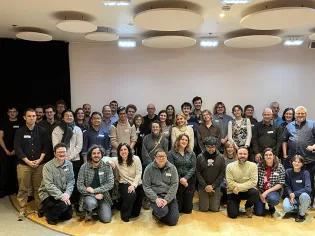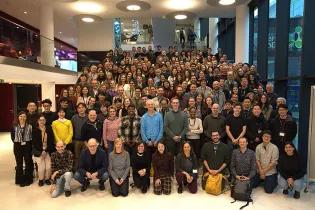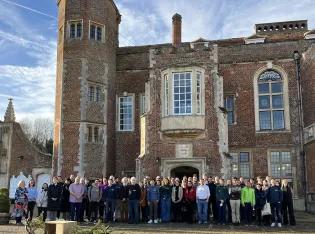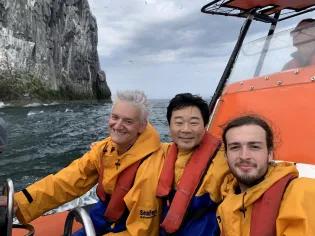News
January 2026
Congratulations to Kenta Moriya and Tomoo Shimada. We collaborate on the analysis of the MpICE2 and MpSETA genes. Kenta's recent paper is now accepted for Journal of Experimental Botany (see Publications page).
Plants evolved from freshwater algal ancestors over 450 million years ago. The move onto land presented the challenge of a much hotter drier environment and led to the evolution of various adaptations including a vasculature for transporting water from soil to aerial tissues, and a waterproof covering (cuticle) to help limit water loss from plant surfaces by evaporation. We are interested in the genes that control some of these plant adaptations to life on land. For example, we identified the master regulatory genes that control the formation of a novel, external water conducting tissue in the liverwort Marchantia polymorpha. We are using comparative analysis in evolutionarily diverse plant lineages to identify key components of the ancestral genetic toolkit that helped plants adapt to life on land.
Find out about opportunities to join the group.
Publications from the lab.
Acknowledging the support of our funders.
Congratulations to Kenta Moriya and Tomoo Shimada. We collaborate on the analysis of the MpICE2 and MpSETA genes. Kenta's recent paper is now accepted for Journal of Experimental Botany (see Publications page).
Non-seed plant meeting in Norwich, organised by Phil Carella (John Innes Centre). Justin presented our results on sporophyte development.
Next year Sandy Hetherington and Justin will host the non-seed plant meeting in Edinburgh.

EMBO workshop "Plant evolution: from origins to diversification on land" in Vienna, Justin attended and presented our recent work in a poster. Excellent meeting, very useful to learn new developments and make new connections

We have been awarded a Leverhulme Trust Research Project Grant “ZHOUPI genes, cell death and the evolution of the endosperm of plant seed”. See our Opportunities page.

The 2024 Non Seed Plants meeting held at Madingley Hall, Cambridge in December with over 60 attendees from UK, Europe, USA and Japan. Together with Dr Laura Moody (University of Oxford) we co-ordinate the annual Non Seed Plant meeting and since the first meeting in Edinburgh (2019) we have had meetings in Oxford (2022), Birmingham (2023) and Cambridge, with funding from The Genetics Society and The Company of Biologists. The next meeting will be in Norwich in December 2025, organised by Dr Phil Carrella.

Former Lab Members Dr Yen-Ting Lu and Dr Nadra Tabassum at the Marchantia Workshop in Hiroshima Japan.

Prof Moto Ashikari (Nagoya University), famous for his work on gibberellins and deepwater rice, visited us and we took him to see the famous gannet colony at Bass Rock near Edinburgh. Nathan Lacombe, a visiting undergraduate from Paris University also took part.

This article was published on